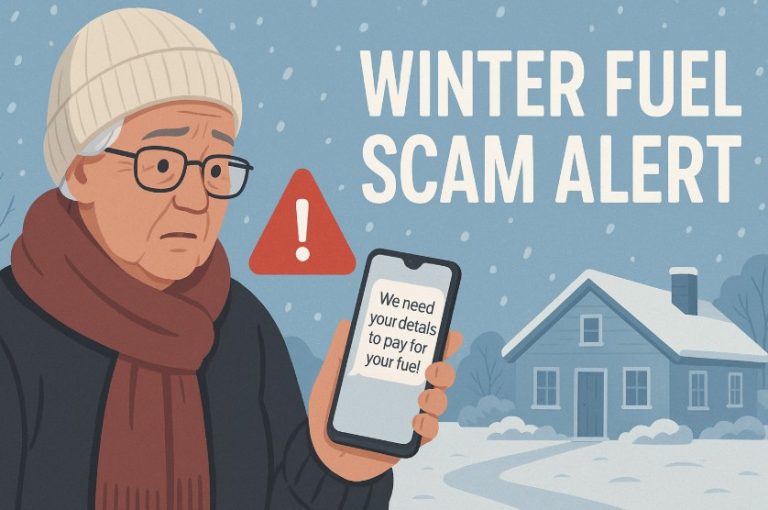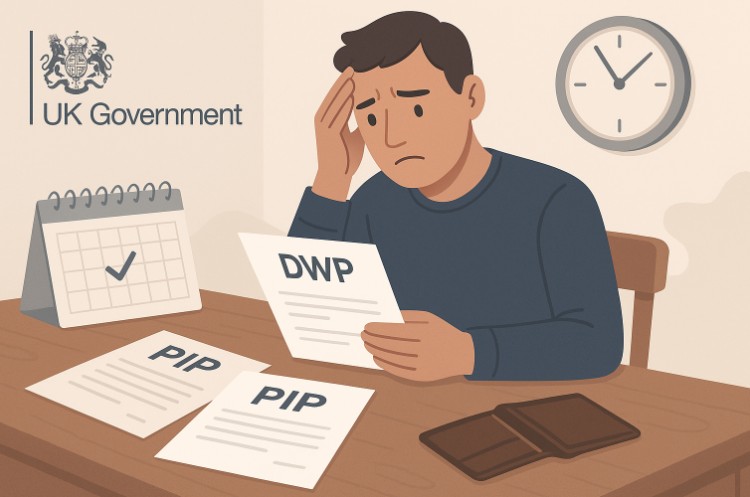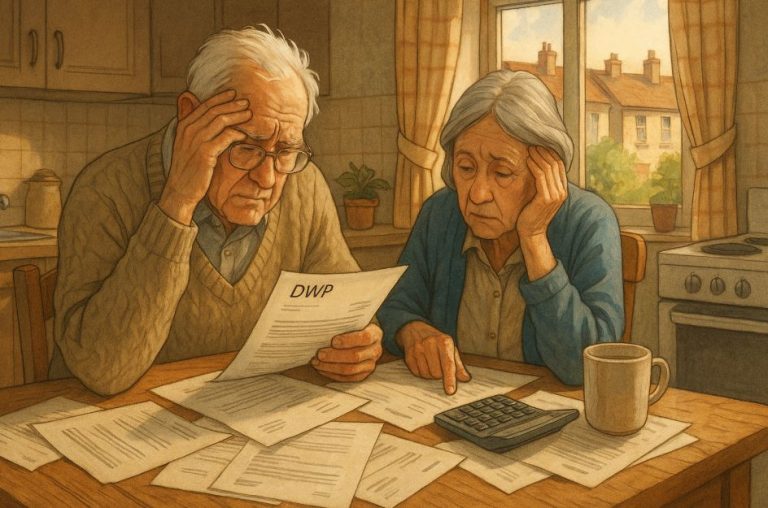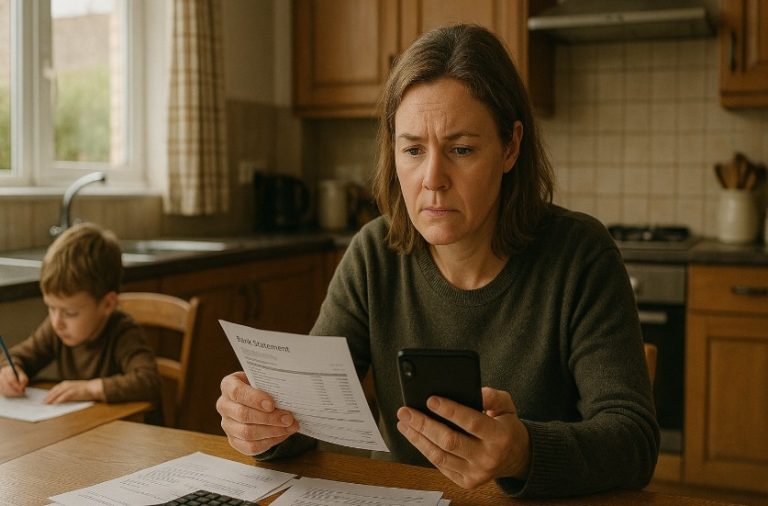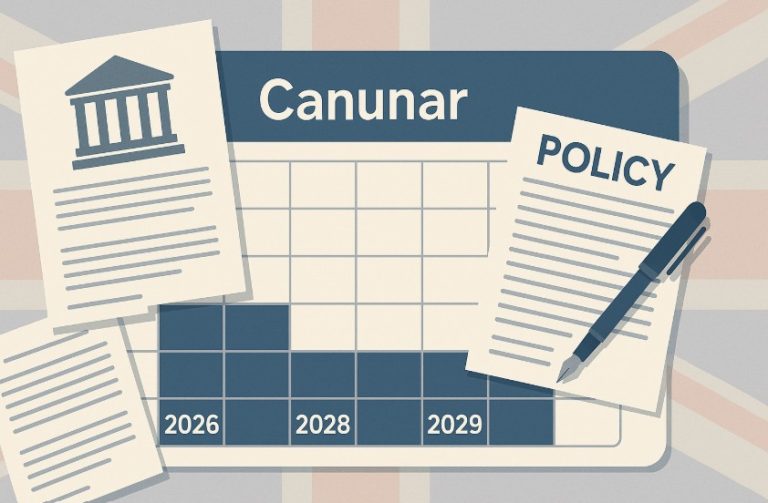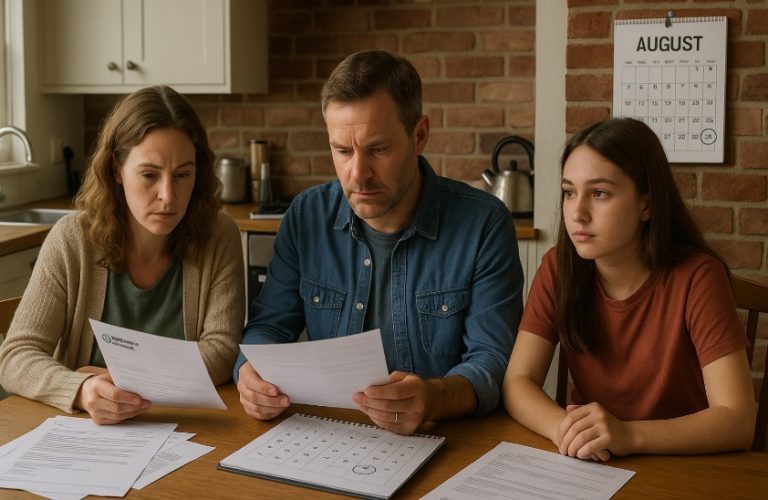Understanding how Child Benefit works for a third child can be confusing, especially with overlapping policies like the two-child limit on other benefits.
This article clarifies whether families in the UK can still receive payments for a third child and how much they can expect.
With updated 2025 rates and a breakdown of eligibility and exceptions, parents and guardians can make informed decisions about claiming Child Benefit for larger families through official channels.
What is Child Benefit and Who is Eligible to Claim It?

Child Benefit is a regular financial support payment provided to individuals who are responsible for raising children in the UK. It is not means-tested, which means families can claim it regardless of their income, although high earners may be required to pay some or all of it back through the High Income Child Benefit Charge.
To qualify, the applicant must be:
- Living in the UK
- Responsible for a child under 16, or under 20 if in approved education or training
- Providing day-to-day care for the child
Only one person can claim Child Benefit per child, even if both parents share custody. Eligibility is not influenced by employment status, so both employed and self-employed individuals can make a claim.
Can You Claim Child Benefit for a Third Child in the UK?
Child Benefit can be claimed for any number of children, including a third child. Unlike certain other benefits, such as Universal Credit and Child Tax Credit, Child Benefit is not limited to two children. This means there is no cap on how many children you can include in your Child Benefit claim.
There is some confusion among parents due to the introduction of the two-child limit for means-tested benefits in April 2017. However, this limit does not affect Child Benefit. It specifically applies to the child element of Universal Credit and Child Tax Credit.
For parents of a third child, this means:
- You can claim Child Benefit regardless of when your third child was born
- You will receive the standard amount set for additional children
- Your total claim increases with each child added
How Much is Child Benefit for a Third Child in 2025?
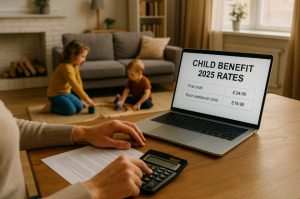
In 2025, Child Benefit payments have been increased in line with inflation. Payments are calculated based on whether the child is the eldest or an additional child.
The weekly rates are as follows:
| Child Position | Weekly Rate | Monthly Rate | Annual Total |
| Eldest or only child | £25.60 | £110.93 | £1,331.20 |
| Additional children | £16.95 | £73.45 | £881.40 |
If you have three children and your first child is eligible, you will receive the higher rate for that child and the lower rate for the second and third children.
Example:
- First child: £25.60/week
- Second child: £16.95/week
- Third child: £16.95/week
Total weekly payment: £59.50
Total annual payment: £3,094.00
The rates apply as long as the child remains eligible, and you can add additional children to your claim at any time using the GOV.UK Child Benefit service.
Does the Two-Child Policy Affect Child Benefit for a Third Child?
The two-child limit policy, introduced in April 2017, restricts additional payments for third or subsequent children in some benefits like Universal Credit and Child Tax Credit. However, Child Benefit is not affected by this policy.
This is a critical distinction, as many parents incorrectly assume they cannot claim Child Benefit for children beyond the second. The policy only impacts the child elements of means-tested benefits and not universal benefits like Child Benefit.
Exceptions to the Two-Child Limit (for other benefits)
- Multiple births (e.g., twins or triplets)
- Adoption cases
- Non-parental care arrangements (e.g., guardianship)
- A child of your own has a child
- Non-consensual conception
- Other children on the claim are already covered by an exception
These exceptions do not change eligibility for Child Benefit but may affect your entitlement to additional support through other schemes.
How Do You Apply for Child Benefit for a Third Child?
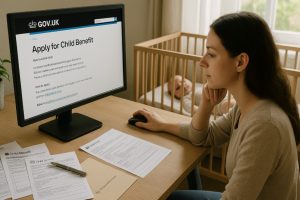
Applying for Child Benefit is straightforward and can be done either online or by post. If you are already receiving Child Benefit for other children, you can simply add the third child to your existing claim.
To apply, you will need:
- Your National Insurance number
- The child’s birth certificate or adoption certificate
- Details of any previous claims (if applicable)
There are two main application methods:
- Online through the GOV.UK Child Benefit service
- By post using the CH2 form
The processing time is generally between 6 and 12 weeks. Adding a child to an existing claim may be faster.
Key points:
- Claim as soon as the child is born or comes into your care
- Keep documentation ready, including proof of identity
- Ensure you notify HMRC of any changes in circumstances
Will Child Benefit Be Backdated for a Third Child?
Yes, Child Benefit can be backdated for a third child, but there are strict time limits in place. If you don’t apply immediately after your third child is born or comes into your care, you could still receive payments for a limited period prior to your application date. According to HMRC guidance, Child Benefit claims can be backdated for up to three months.
This means that even if there is a delay in submitting your claim, you won’t necessarily miss out on the financial support for those early weeks or months, provided you meet the eligibility criteria during that time.
Key Conditions for Backdating
- The child must have been living with you during the backdating period.
- You must have had responsibility for the child.
- The child must have been under 16, or under 20 if in approved education or training.
- You must submit the claim within three months of when you wish payments to begin.
Common Reasons for Delayed Claims
- Delays in registering the birth, particularly if born abroad.
- Lack of awareness that Child Benefit applies to a third child.
- Waiting on necessary documents, such as the child’s birth certificate.
- Uncertainty around how the two-child limit affects benefit entitlement.
- Administrative delays, especially if the parents are new to the system or adding the child to an existing claim.
If any of the above situations apply to you, it’s important to still proceed with your application and request backdating where appropriate. You can do this during the application process either online or by post using the CH2 form.
How to Request Backdating?
- When applying online, ensure you indicate the actual date you became responsible for the child.
- If applying by post, include a written request or check the relevant box on the CH2 form.
- Provide any relevant documentation or explanation if requested by HMRC.
It’s worth noting that HMRC will not automatically backdate your claim beyond the three-month window. Any attempt to request backdating for a longer period is unlikely to be successful unless you can provide strong and specific evidence of exceptional circumstances, such as hospitalisation or legal disputes over custody.
Why Backdating Matters?
Missing the backdating window could result in a permanent loss of payments for the months prior to your claim. For a third child, this could amount to £16.95 per week, which equates to over £200 in missed support if you delay claiming for three months.
Example Scenario
A parent gives birth to a third child on 1 January but doesn’t apply for Child Benefit until 1 April.
As long as the application is submitted by the end of April, they can request backdating to cover the period from January to April, and receive the full entitlement.
Being proactive with your Child Benefit application ensures you receive your full entitlement and avoid unnecessary financial loss.
Are There Income Limits That Affect Child Benefit for a Third Child?

While Child Benefit itself is not income-based, the High Income Child Benefit Charge (HICBC) applies if either parent earns more than £50,000 annually.
Here is how it works:
| Annual Income | Impact on Child Benefit |
| £50,000 or less | Full Child Benefit retained |
| £50,001 to £60,000 | Partial repayment required |
| Over £60,000 | Full repayment required |
You may still choose to receive Child Benefit and repay it through the Self Assessment process, or you may opt out of payments but continue to receive National Insurance credits, which count toward your State Pension.
Many families still choose to claim and repay, especially if one partner is not working or paying National Insurance.
Can You Receive Child Benefit If You’re Claiming Universal Credit?
Yes, you can receive Child Benefit while also claiming Universal Credit. The two benefits operate independently and are not mutually exclusive.
Important details:
- Child Benefit does not count as income for Universal Credit purposes
- The child element of Universal Credit is affected by the two-child limit, but Child Benefit is not
- You may still receive the basic child element for the first two children in Universal Credit, and Child Benefit for all eligible children
Combining Child Benefit and Universal Credit can increase total family income, but it’s essential to understand how the two-child limit may impact Universal Credit payments specifically.
What Happens to Child Benefit When a Child Turns 16 or 18?

Child Benefit normally stops on 31 August following the child’s 16th birthday. However, payments can continue if the child remains in approved education or training.
Approved education includes:
- A-levels
- T Levels
- Scottish Highers
- BTECs
- Home education (if started before age 16)
It does not include university-level education or paid work-based training.
You must inform HMRC if the child is continuing in education; otherwise, payments will stop automatically. If the child continues in an eligible course, Child Benefit can be paid until their 20th birthday.
Conclusion
Families with three or more children are still entitled to claim Child Benefit for each eligible child, regardless of the two-child limit applied to other benefits.
With no cap on the number of children covered and the ability to backdate claims, understanding your entitlements is essential.
By following the correct application process and staying informed about income thresholds, you can ensure you receive all the support available under the current UK Child Benefit system.
FAQs About Claiming Child Benefit for More Than Two Children
Do you get less Child Benefit if you have more children?
No. While the amount per additional child is lower than for the first, it remains the same for each additional child, regardless of how many you have.
Can grandparents claim Child Benefit for a third child?
Yes, if they are the main carers and the child lives with them. They must not be receiving benefit payments for the same child elsewhere.
How often is Child Benefit paid?
It is usually paid every 4 weeks on a Monday or Tuesday. You can request weekly payments if you’re a single parent or receiving certain other benefits.
Can you claim Child Benefit for a third child if you’re self-employed?
Yes. Your employment status doesn’t affect your eligibility to claim Child Benefit.
What happens if I forget to claim Child Benefit for my third child?
You can still claim, and the benefit may be backdated for up to 3 months, provided you’re eligible during that period.
Is Child Benefit taxable?
Child Benefit itself is not taxable, but if you or your partner earns over £50,000, you may need to pay the High Income Child Benefit Charge.
Can I stop receiving Child Benefit if I don’t want to pay the charge?
Yes. You can opt out of receiving payments while still maintaining your National Insurance credits for your pension.

